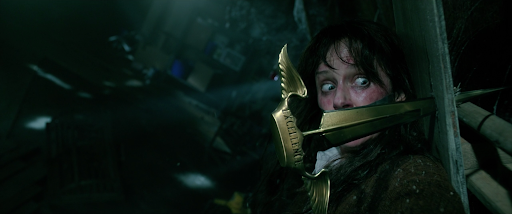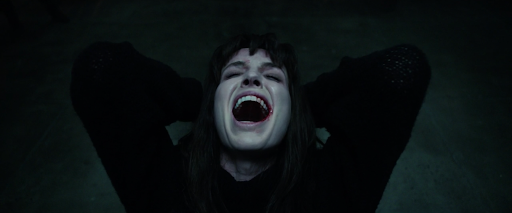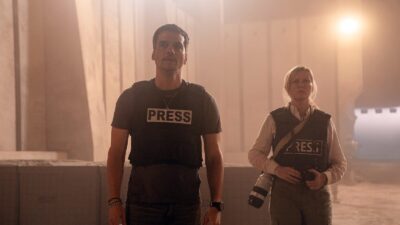James Wan’s latest, MALIGNANT, is a unique outing in the context of the filmmaker’s output to date. Wan bears responsibility for incepting two of the biggest horror franchises ever: the SAW and THE CONJURING universes. Both, horrifically enough, have remained animated long after their mortality as films would dictate. Wan admittedly has a talent for franchising, taking low budget high concepts into the realm of absurdly profitable entertainment—it’s no easy task and I’m not knocking him for it. There was some minor hooplah when MALIGNANT was announced, with Wan asserting that the movie was an original concept and not based on any preexisting IP, a rare move by a filmmaker who clearly understands the contours of the modern box office and its demand for products that proclaim nothing but their own existence: the same, but different. Wan is at least sort of right about his new movie: MALIGNANT is an original property, based on absolutely nothing preexisting—except basically every horror trope ever invented.
MALIGNANT wastes no time establishing its characters, whose shadows are perfectly cut from cardboard. We meet pregnant Maddison and her sports enthusiast boyfriend with a penchant for domestic violence. Things quickly take a turn for the upsetting and, soon enough, the grotesque. The screenplay leeches off the most tired tropes from both horror and procedural dramas, including the world-wearied Black detective, whose job of frequently expressing exasperation at the kooks around her takes priority over the one she has enforcing the law. When the characters aren’t translucently derivative, they’re boring. Wan hopes that you will sympathize with Maddison because of her continual traumatization which, to some extent, works. But the viewer’s connection to her is tenuous, relying on her continued abuse; once the movie ceases torturing Maddison, you’re left with a character as empty as the cruelty inflicted on her. The sadism she is subject to is no substitute for a personality.

There’s no question that Wan is a talented filmmaker, and on occasion drafts compelling scenes. After a rageful bout of abuse, Derek leaves the bedroom, compelled by guilt. Maddison scurries up against the door. In the same shot, we hear Derek’s voice from behind the door as he pleads for forgiveness. Wan pans over to the doorknob, as if initiating a phantom two-shot, holding Maddison in the frame as well. When Maddison’s heard enough of Derek’s muffled apology, we pan the doorknob out and the camera situates Maddison back into the frame, alone. Such ingenuity can be found in a lot of Wan’s setups, but the problem is he’s too attached to camera movement—Wan’s camera is too invested for this to be much of a horror film. The camera hovers next to Maddison, feet away on a wide angle, and tracks her movements. You get the sense that she isn’t really alone; the camera’s there alongside her, like a comforting friend. Though the film’s tension relies on Maddison’s feelings of alienation, it also works overtime to soothe them. There is, however, a climactic twist that serves as a clever, retroactive justification for the camera’s omnipresent proximity, but it doesn’t make the scenes scarier in hindsight. Scares take a backseat in the second act, when the film morphs into a boilerplate thriller. There’s amnesia, archive hunting in black-as-pitch basements, and lots of cop flashlights treading suspensefully through bleak apartments. The eventual resurgence of horror amps up the schlock factor; icky reveals abound.

To pitch something from left field: 9/11 has been in the news of late, and the quandary of Wan’s unoriginal original film brings to mind The War On Terror architect Donald Rumsfeld’s fateful 2002 explication of “unknown knowns,” “known knowns,” “unknown unknowns,” etc. as rationale for the U.S. invading Iraq over nukes we knew they didn’t have. Rumsfeld was speaking of American foreign policy, whose guiding forces of course correction and conspicuous detente, are not dissimilar to the box office’s efforts to guide public opinion.
MALIGNANT is an unoriginal original film. That is to say, an original film that is not very original. This is favorable to unoriginal unoriginal films—movies that aren’t new, that don’t do anything new. But we’re at a dearth of original original film: new work that does something new, shows us things we didn’t know we didn’t know. In a sense, Donald Rumsfeld’s oration prophesied the current scape of the movie industry. Movies now exist on a spectrum of rhetorical complacency. Even the things we haven’t seen before, we have seen before, like MALIGNANT. There is a war on movies. There is a war being waged by corporations flirting with monopoly, by recalcitrant ideas amongst producers and investors about what kind of projects should be funded, especially in a post-COVID world. There is a war on movies as we know them. And we know what we know.















Comments